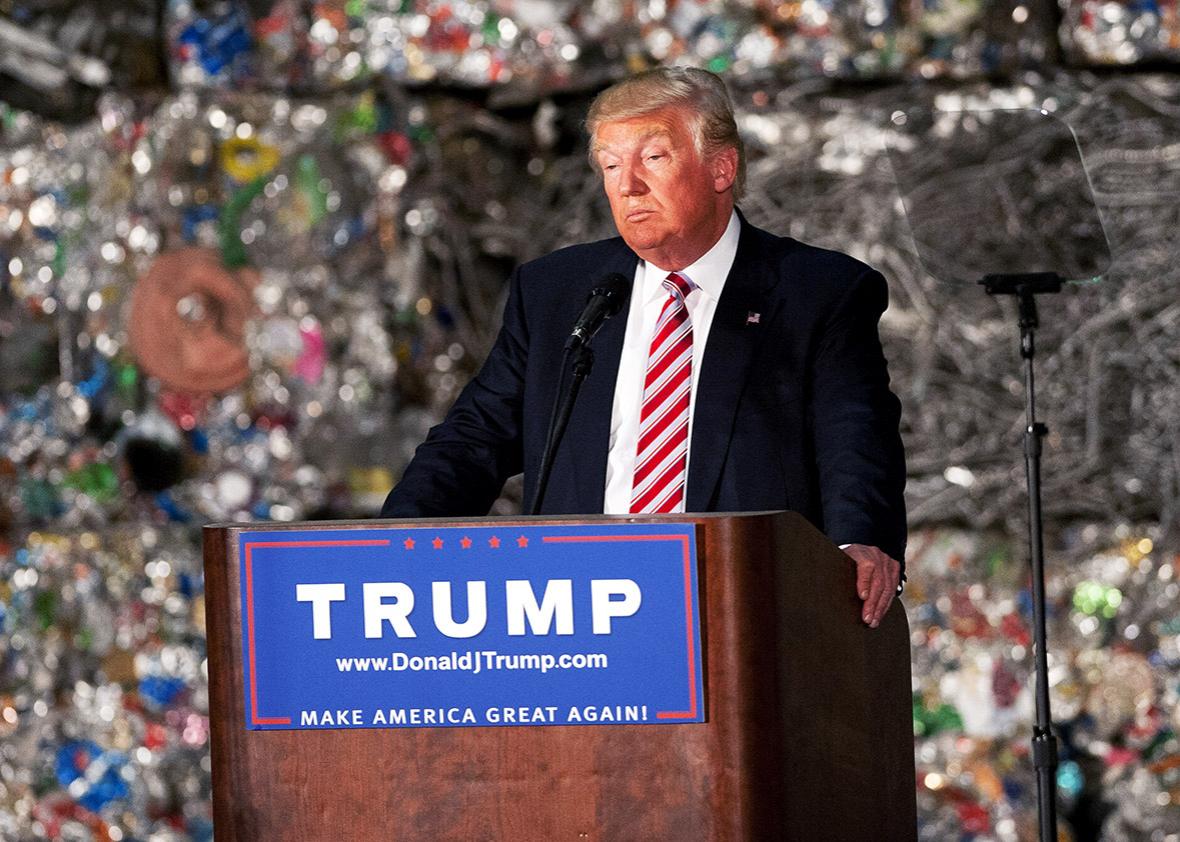It’s not news that Donald Trump trails Hillary Clinton in national polling. As of Thursday, he’s down 44.6 percent to 39.8 percent in the RealClearPolitics polling average, down 45.5 percent to 38.6 percent in the HuffPost Pollster average, and down 44 percent to 39 percent points in the New York Times average. Swing state polls tell a similar story, with Trump down in almost every state that’s up for grabs in November.
Now, there’s a caveat here. Compared with spring or fall, the early summer is the least reliable period for presidential election polls. The reasoning is simple: Often, the two parties are still sorting out tensions and divisions from their primaries. Depending on the shape and tenor of their contests, one side might be more unified than the other, which produces an imbalance. We saw this in late May when Trump tied or led Clinton in several general election polls. But this made sense as Clinton was still engaged in a divisive nomination fight, alienating Democrats who would otherwise back her campaign against a Republican. And the real estate mogul had just cinched the nomination, yielding a post-primary bounce as he consolidated support across the party.
But “least reliable” doesn’t mean unreliable, and at this stage, the polls are telling a new story. At the same time that Clinton has started to unify the Democratic Party ahead of its convention, Trump has done the reverse. Now, as much as ever, the Republican Party is divided and fractious on the question of its nominee. And in this case, it may not get better.
More than half of Republicans want someone else to lead their party in the fall, according to a new Fox News survey of the electorate, with the greatest anti-Trump sentiment among Republican women and Republicans with college degrees. Overall, as Phillip Bump shows for the Washington Post, using data from HuffPost Pollster, Trump wins an average of around 80 percent of Republicans, down from May when his support among co-partisans reached the mid-80s. Hillary Clinton, by contrast, wins close to 86 percent of Democrats. Likewise, according to a new survey of swing states by Greenberg Quinlan Rosner, a Democratic polling firm, Clinton has consolidated 89 percent of Democrats while Trump holds only 80 percent of Republicans. In a national election, a difference in party unity of five or six percentage points can be dispositive, especially if one candidate is winning a higher-than-normal number of voters on the other side. And that’s where Clinton stands: She pulls around 8 percent of Republicans, while Trump wins around 5 percent of Democrats.
Once again, however, it’s only July. The conventions—where nominees are buffed and shined and celebrated in primetime—haven’t happened yet. Republicans could remember that they’re Republicans and return to Trump’s column in a spasm of post-convention partisan loyalty. And indeed, this is what we would see if Trump were more like a typical candidate. The problem for his campaign, and for the GOP writ large, is that he’s extremely atypical. In addition to his erratic behavior and offensive, often demagogic rhetoric (the attacks on federal Judge Gonzalo Curiel are exhibit A here), Trump rejects the Republican consensus on economic policy, and is silent on issues of abortion and same-sex marriage. He’s made little effort to assuage or appeal to party donors and faces a backlash from skittish party elites. Some delegates want to derail Trump at the convention, while dozens of prominent Republicans, from senators and governors to ex-presidents and former nominees, just aren’t attending. Mitt Romney is loudly anti-Trump, as are other GOP heavyweights. John Kasich is still governor of Ohio and he’s not attending the convention, which Republicans are holding in Cleveland. Far from a coronation of Trump, there’s every indication that this convention will be a bonanza of chaos and confusion.
This matters. If a normal convention boosts party unity by activating and celebrating partisan identity, a chaotic one corrodes it by highlighting anger and division in the ranks. Most nominees receive a boost after they officially claim the nomination: It stabilizes the race and sets the stage for the fall. In fact, it’s the August after the convention when polls reach their most stable and reliable state. Donald Trump, however, might be the exception.
Without a weeklong endorsement from Republican stars and luminaries—and with wide coverage of any division and disruption—there’s a strong chance that Trump gains nothing from his convention. It might even hurt him. It’s not out of the question that, come the fall, the Republican Party will be less unified than it is now.
If there’s a reason to discount this, it’s the campaign itself. Rallies, advertising, and surrogates could make up the difference, reminding Republican voters of their loyalties and heightening the election’s stakes. But Trump isn’t running a real campaign, is he? With little staff, little cash, and little advertising, he’s done almost nothing to rebut the tens of millions in pro-Clinton spending. Trump may have an iron grip on cable news, but that’s of limited help when the coverage is almost always negative, and when it doesn’t counteract the harsh and relentless blitz from Team Clinton.
In the coming months, Americans will hear all the reasons they shouldn’t vote for Donald Trump from figures across the political spectrum, as Democrats and Republicans speak out against his candidacy. And Trump, it’s clear, isn’t ready or able to do anything about it.
